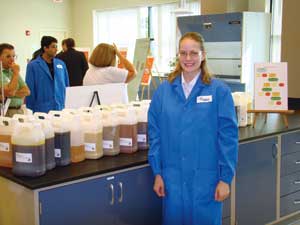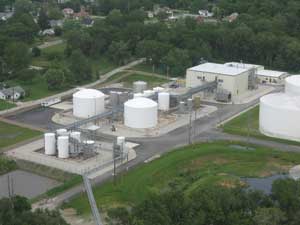Sophistication and Delivery





November 20, 2009
BY Nicholas Zeman
Tri-State Biodiesel Inc. of New York City focused on feedstock procurement before anything else in developing its biodiesel business-and it has paid off. The company has avoided using refined vegetable oils from the start. "By taking that tack, we've been profitable through the recession and we've grown in an organic way," says CEO Brent Baker. Tri-State Biodiesel now services 2,700 restaurants in the New York City region as grease collector and it supplies feedstock to area biodiesel plants.
Tri-State Biodiesel also sells biodiesel and has an aggressive pitch. Interestingly, the company hasn't produced any fuel yet, but its management thinks the time is now right to get into the production side of the industry, and is building its first methyl ester plant.
This model could be a recipe for success, and it is quite unique compared to many other business plans for biodiesel production, and there are many. "It really comes down to where you're at in the supply chain," says Daniel Oh, chief operating officer for Ames, Iowa-based Renewable Energy Group Inc. "Are you going to refine fuel, market it…offer management services? There's a long-standing debate over whether it's better to be focused or diversified. At REG, we take the position that it's better to be diversified."
Don Lossing of Frazier, Barnes & Associates LLC in Memphis, Tenn., reiterated that being vertically integrated was an ideal situation for biodiesel producers. REG is vertically integrated-the only thing it doesn't do is grow feedstock. On the other hand, Tri-State Biodiesel has focused on feedstock to develop its business and is now starting to move into the vertically integrated model. "There are a lot of different models, but they all have to have excellent management," Oh says. Tri-State Biodiesel has different experts overseeing every aspect of its business: a chemical engineer, an attorney, an accountant, a salesman and a logistics and routing manager. REG has a lab devoted exclusively to feedstock development, and sales managers strategically located in different regions.
Regional differences, combined with idiosyncratic fuel needs-from bioheat in New England to Great Lakes maritime applications-create the opportunity for several business designs to be successful. Large-scale producers, including renewable diesel facilities, try to meet the needs of the industrial buyers, the oil companies, while small-scale plants can identify niche locations in feedstock procurement and work with specific municipalities for off-take agreements.
"I see factors pulling both ways," says Mark Warner of the Seattle-based engineering firm Harris Group Inc. "You can't get 50 MMgy of tallow, but Big Oil doesn't want to buy from five small plants. They want to make big purchases-in the two- to three-million gallon range-and there are really very few facilities right now that can accommodate this."
Planning, conducting feasibility studies and designing a unique production scheme before ever approaching a bank to get a loan are prerequisites now more than ever. Banks are only loaning to the smartest, most prepared projects. "If your model isn't adaptive it doesn't matter if you're Alexander the Great, you won't be able to get it done," Oh says.
Process Optimization
It's always important to be the lowest-cost producer. Plant optimization, as much as it involves technology, is actually a management strategy. It means good managers are always looking to upgrade or optimize the efficiencies of their process, and that's the case in all manufacturing enterprises-not just biodiesel. When to pursue process optimization, which often involves a capital investment in new technologies, depends upon the timing skills and decisions of a management team. REG has invested in an array of technologies that the company has implemented throughout its network of biodiesel plants, but having the right equipment alone is not enough. "If you are processing multiple feedstocks, they can affect each other in different ways," Oh tells Biodiesel Magazine.
Most of the industry is cash-strapped, but if producers have funds at their disposal they are investing in technologies and products that will allow them to process multiple feedstocks, including those with high free fatty acid (FFA) content, says Warner, a process engineer who helped build Imperium Renewables Inc.'s 100 MMgy plant in Gray's Harbor, Wash. "Plants are also interested in refinement technologies to produce a higher grade of glycerin," Warner says. "There really aren't any opportunities anymore in crude glycerin."
"The companies that we've seen struggle are the ones that pursue their own process technology designs without an adequate amount of in-house expertise," Warner says. "For those projects that pursue models based on 5 MMgy or less, we recommend a prepackaged facility."
Technological expertise is certainly an aspect of biodiesel management that has to be coordinated with risk assessment sophistication and logistical prowess. For instance, different feedstocks affect each other in different ways, so you have to know the right ratios to use them in, Oh says. "It's that craft knowledge that has to be combined with risk management and technological expertise-and none of them can be overlooked."
Contending with Market Forces
Raw materials prices trail energy on the way up and on the way down, which means hedging sales and procurement on the futures contracts can be a very tricky situation for risk managers. "When you're pairing an ag-input (feedstock) pricing structure with an oil-pricing structure, they don't move the same way," Oh says. "It requires additional work to bridge those two pricing structures in your risk management system while educating customers on how deals can be structured." A high-level of skill is required to buy feedstocks on volatile ag-markets and then sell fuel in competition with oil on the backend. It takes so much time, effort and education that most managers are unwilling to divulge their particular strategies as bona fide trade secrets.
As for a baseline to price waste feedstock inputs, supply managers have to find substitutes with tradtional pricing structures. "Home heating oil is often used to price grease-there's a high level of correlation there," Lossing says. Because waste greases and other emerging feedstocks are difficult to price, producers should not pursue contracts that are longer than 60 days to 90 days.
On the backend, one mistake said to be made by biodiesel companies-especially their salesmen-is that they have expected a premium price for their product. But with the proliferation of fatty acid methyl esters made from unspecified feedstocks, the discounts can be very substantial compared to what soy methyl ester producers have been trying to get traditionally.
Another management strategy or trend has been the diversification of a company's feedstock portfolio. Depending on refined commodities as part of your production scheme is simply no longer an option for most plants. "But you have to remember that as biodiesel production shifts away from virgin oils, it is also shifting away from the ag-sector, which has been one of its biggest supporters," Lossing says. "There are also more quality issues associated with [biodiesel from non-virgin oil sources], and there's a very limited stock of waste materials available."
Keeping a founding contingency of the industry such as the soybean growers involved in a project's business model might be a subtle and diplomatic insight some managers consider, even as they lessen their dependence on virgin vegetable oils as a feedstock. On the backend, how a producer considers its relationship with the petroleum industry can also be strategic. "I don't think that biodiesel and petroleum are in competition with each other," Oh says. "We try to find pathways where they are not in conflict."
Plants are still getting built and new production is coming online regularly, but Oh says the U.S. EPA's lack of implementing the revised renewable fuels standard in 2009, which was never fully expected, has hurt the industry. Also, evolution is naturally causing the weaker models and management strategies to go extinct. "There has been a shakeout going on," Oh says.
Nicholas Zeman is an associate editor for Biodiesel Magazine. Reach him at (701) 738-4972 or nzeman@bbiinternational.com.
Tri-State Biodiesel also sells biodiesel and has an aggressive pitch. Interestingly, the company hasn't produced any fuel yet, but its management thinks the time is now right to get into the production side of the industry, and is building its first methyl ester plant.
This model could be a recipe for success, and it is quite unique compared to many other business plans for biodiesel production, and there are many. "It really comes down to where you're at in the supply chain," says Daniel Oh, chief operating officer for Ames, Iowa-based Renewable Energy Group Inc. "Are you going to refine fuel, market it…offer management services? There's a long-standing debate over whether it's better to be focused or diversified. At REG, we take the position that it's better to be diversified."
Don Lossing of Frazier, Barnes & Associates LLC in Memphis, Tenn., reiterated that being vertically integrated was an ideal situation for biodiesel producers. REG is vertically integrated-the only thing it doesn't do is grow feedstock. On the other hand, Tri-State Biodiesel has focused on feedstock to develop its business and is now starting to move into the vertically integrated model. "There are a lot of different models, but they all have to have excellent management," Oh says. Tri-State Biodiesel has different experts overseeing every aspect of its business: a chemical engineer, an attorney, an accountant, a salesman and a logistics and routing manager. REG has a lab devoted exclusively to feedstock development, and sales managers strategically located in different regions.
Regional differences, combined with idiosyncratic fuel needs-from bioheat in New England to Great Lakes maritime applications-create the opportunity for several business designs to be successful. Large-scale producers, including renewable diesel facilities, try to meet the needs of the industrial buyers, the oil companies, while small-scale plants can identify niche locations in feedstock procurement and work with specific municipalities for off-take agreements.
"I see factors pulling both ways," says Mark Warner of the Seattle-based engineering firm Harris Group Inc. "You can't get 50 MMgy of tallow, but Big Oil doesn't want to buy from five small plants. They want to make big purchases-in the two- to three-million gallon range-and there are really very few facilities right now that can accommodate this."
Planning, conducting feasibility studies and designing a unique production scheme before ever approaching a bank to get a loan are prerequisites now more than ever. Banks are only loaning to the smartest, most prepared projects. "If your model isn't adaptive it doesn't matter if you're Alexander the Great, you won't be able to get it done," Oh says.
Process Optimization
It's always important to be the lowest-cost producer. Plant optimization, as much as it involves technology, is actually a management strategy. It means good managers are always looking to upgrade or optimize the efficiencies of their process, and that's the case in all manufacturing enterprises-not just biodiesel. When to pursue process optimization, which often involves a capital investment in new technologies, depends upon the timing skills and decisions of a management team. REG has invested in an array of technologies that the company has implemented throughout its network of biodiesel plants, but having the right equipment alone is not enough. "If you are processing multiple feedstocks, they can affect each other in different ways," Oh tells Biodiesel Magazine.
Most of the industry is cash-strapped, but if producers have funds at their disposal they are investing in technologies and products that will allow them to process multiple feedstocks, including those with high free fatty acid (FFA) content, says Warner, a process engineer who helped build Imperium Renewables Inc.'s 100 MMgy plant in Gray's Harbor, Wash. "Plants are also interested in refinement technologies to produce a higher grade of glycerin," Warner says. "There really aren't any opportunities anymore in crude glycerin."
"The companies that we've seen struggle are the ones that pursue their own process technology designs without an adequate amount of in-house expertise," Warner says. "For those projects that pursue models based on 5 MMgy or less, we recommend a prepackaged facility."
Technological expertise is certainly an aspect of biodiesel management that has to be coordinated with risk assessment sophistication and logistical prowess. For instance, different feedstocks affect each other in different ways, so you have to know the right ratios to use them in, Oh says. "It's that craft knowledge that has to be combined with risk management and technological expertise-and none of them can be overlooked."
Contending with Market Forces
Raw materials prices trail energy on the way up and on the way down, which means hedging sales and procurement on the futures contracts can be a very tricky situation for risk managers. "When you're pairing an ag-input (feedstock) pricing structure with an oil-pricing structure, they don't move the same way," Oh says. "It requires additional work to bridge those two pricing structures in your risk management system while educating customers on how deals can be structured." A high-level of skill is required to buy feedstocks on volatile ag-markets and then sell fuel in competition with oil on the backend. It takes so much time, effort and education that most managers are unwilling to divulge their particular strategies as bona fide trade secrets.
As for a baseline to price waste feedstock inputs, supply managers have to find substitutes with tradtional pricing structures. "Home heating oil is often used to price grease-there's a high level of correlation there," Lossing says. Because waste greases and other emerging feedstocks are difficult to price, producers should not pursue contracts that are longer than 60 days to 90 days.
On the backend, one mistake said to be made by biodiesel companies-especially their salesmen-is that they have expected a premium price for their product. But with the proliferation of fatty acid methyl esters made from unspecified feedstocks, the discounts can be very substantial compared to what soy methyl ester producers have been trying to get traditionally.
Another management strategy or trend has been the diversification of a company's feedstock portfolio. Depending on refined commodities as part of your production scheme is simply no longer an option for most plants. "But you have to remember that as biodiesel production shifts away from virgin oils, it is also shifting away from the ag-sector, which has been one of its biggest supporters," Lossing says. "There are also more quality issues associated with [biodiesel from non-virgin oil sources], and there's a very limited stock of waste materials available."
Keeping a founding contingency of the industry such as the soybean growers involved in a project's business model might be a subtle and diplomatic insight some managers consider, even as they lessen their dependence on virgin vegetable oils as a feedstock. On the backend, how a producer considers its relationship with the petroleum industry can also be strategic. "I don't think that biodiesel and petroleum are in competition with each other," Oh says. "We try to find pathways where they are not in conflict."
Plants are still getting built and new production is coming online regularly, but Oh says the U.S. EPA's lack of implementing the revised renewable fuels standard in 2009, which was never fully expected, has hurt the industry. Also, evolution is naturally causing the weaker models and management strategies to go extinct. "There has been a shakeout going on," Oh says.
Nicholas Zeman is an associate editor for Biodiesel Magazine. Reach him at (701) 738-4972 or nzeman@bbiinternational.com.
Advertisement
Advertisement
Upcoming Events





